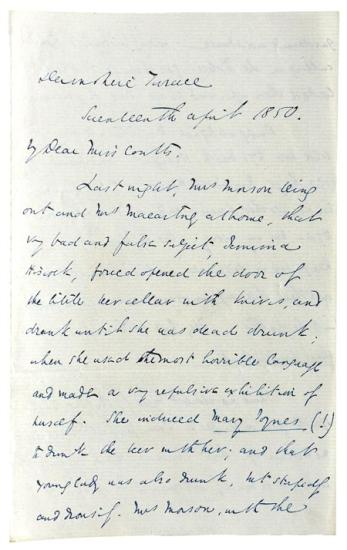Letter 4 | 17 April 1850 | to Angela Burdett-Coutts, page 1

Autograph letter signed, London, 17 April 1850, to Angela Burdett-Coutts
Purchased with the assistance of the Fellows, 1951
Dickens visited London's prisons, workhouses, and other reformatory institutions to identify, interview, and recruit eligible candidates for Urania Cottage. His management of the facility involved dealing with its wide variety of problems, including some of its occasionally troublesome occupants. In this letter he reported an incident of drunkenness: "Last night, Mrs. Morson being out and Mrs. Macartney at home, that very bad and false subject, Jemima Hiscock, forced open the door of the little beer cellar with knives, and drank until she was dead drunk; when she used the most horrible language and made a very repulsive exhibition of herself. She induced Mary Joynes (!) to drink the beer with her; and that young lady was also drunk, but stupidly and drowsily."
Philanthropy
From 1840 Dickens guided the charitable work of philanthropist Angela Burdett-Coutts (1814–1906), the wealthiest heiress in Victorian Britain. Dickens served as her official almoner and helped to assess the merits of the thousands of letters she received from those seeking financial assistance. He also advised on her plan for improved sanitation in the slums of Westminster and drew her attention and support to the Ragged School Union, which provided education to London's poorest children. A pragmatist, Dickens encouraged Burdett-Coutts to direct her philanthropy toward the causes of distress. In 1847 they founded a home, Urania Cottage, in Shepherd's Bush, as a shelter for homeless women—prostitutes or petty criminals who sought to rehabilitate themselves by learning practical skills and developing self-discipline. Many of the women were assisted to eventually emigrate to one of Britain's colonies to begin a new life. For more than ten years, Dickens administered Urania Cottage on behalf of Burdett-Coutts and played an extremely active role in its day-to-day management.
My Dear Miss Coutts.
Last night, Mrs. Morson being out and Mrs. Macartney at home, that very bad and false subject, Jemima Hiscock, forced open the door of the little beer cellar with knives, and drank until she was dead drunk; when she used the most horrible language and made a very repulsive exhibition of herself. She induced Mary Joynes (!) to drink the beer with her; and that young lady was also drunk, but stupidly and drowsily. Mrs. Morson, with the
Letter 4 | 17 April 1850 | to Angela Burdett-Coutts, page 2

Autograph letter signed, London, 17 April 1850, to Angela Burdett-Coutts
Purchased with the assistance of the Fellows, 1951
Dickens visited London's prisons, workhouses, and other reformatory institutions to identify, interview, and recruit eligible candidates for Urania Cottage. His management of the facility involved dealing with its wide variety of problems, including some of its occasionally troublesome occupants. In this letter he reported an incident of drunkenness: "Last night, Mrs. Morson being out and Mrs. Macartney at home, that very bad and false subject, Jemima Hiscock, forced open the door of the little beer cellar with knives, and drank until she was dead drunk; when she used the most horrible language and made a very repulsive exhibition of herself. She induced Mary Joynes (!) to drink the beer with her; and that young lady was also drunk, but stupidly and drowsily."
Philanthropy
From 1840 Dickens guided the charitable work of philanthropist Angela Burdett-Coutts (1814–1906), the wealthiest heiress in Victorian Britain. Dickens served as her official almoner and helped to assess the merits of the thousands of letters she received from those seeking financial assistance. He also advised on her plan for improved sanitation in the slums of Westminster and drew her attention and support to the Ragged School Union, which provided education to London's poorest children. A pragmatist, Dickens encouraged Burdett-Coutts to direct her philanthropy toward the causes of distress. In 1847 they founded a home, Urania Cottage, in Shepherd's Bush, as a shelter for homeless women—prostitutes or petty criminals who sought to rehabilitate themselves by learning practical skills and developing self-discipline. Many of the women were assisted to eventually emigrate to one of Britain's colonies to begin a new life. For more than ten years, Dickens administered Urania Cottage on behalf of Burdett-Coutts and played an extremely active role in its day-to-day management.
gardener's assistance, wisely abstained from calling in the Police, got them both to bed, locked them up, and came to me this morning.
Being obliged to write all day, I told her to go back straight, and immediately discharge Jemima Hiscock—to put her on her own clothes, however bad—and on no account to give her any money. As to Mary Joynes, to keep her in disgrace, until I should get out there this afternoon, and enquire further into the matter. They had both confessed to these particulars.
I have no doubt myself, that they had spirits from outside. I am perfectly sure that no woman of that Jemima Hiscock's habits, could get so madly intoxicated with that
Letter 4 | 17 April 1850 | to Angela Burdett-Coutts, page 3

Autograph letter signed, London, 17 April 1850, to Angela Burdett-Coutts
Purchased with the assistance of the Fellows, 1951
In his 1853 essay "Home for Homeless Women," published in his weekly magazine Household Words, Dickens wrote that the Urania Cottage project hoped to achieve success in thirty to fifty percent of its cases. By 1853 it had exceeded this goal: of the fifty-eight women who had passed through the home, thirty were thought to have flourished after emigration. In the case of the other inmates, three had relapsed during the passage to Australia, seven had left the home during the probationary period, seven had fled, and ten had been discharged. In this letter to William Brown, the physician on the Urania Cottage management committee, Dickens commented that one of the expelled women, named Sesina, "would corrupt a Nunnery in a fortnight."
Philanthropy
From 1840 Dickens guided the charitable work of philanthropist Angela Burdett-Coutts (1814–1906), the wealthiest heiress in Victorian Britain. Dickens served as her official almoner and helped to assess the merits of the thousands of letters she received from those seeking financial assistance. He also advised on her plan for improved sanitation in the slums of Westminster and drew her attention and support to the Ragged School Union, which provided education to London's poorest children. A pragmatist, Dickens encouraged Burdett-Coutts to direct her philanthropy toward the causes of distress. In 1847 they founded a home, Urania Cottage, in Shepherd's Bush, as a shelter for homeless women—prostitutes or petty criminals who sought to rehabilitate themselves by learning practical skills and developing self-discipline. Many of the women were assisted to eventually emigrate to one of Britain's colonies to begin a new life. For more than ten years, Dickens administered Urania Cottage on behalf of Burdett-Coutts and played an extremely active role in its day-to-day management.
weak beer. I am inclined to think, from the difference in the states of the two, that she had spirits and Mary Joynes had not. A woman was seen looking over the palings where Hannah Myers and Ellen Walsh broke out; and from certain circumstances and artifices recently observed in Jemima, I am strongly impressed with the belief that she was in communication with people outside, and wanted to lay hands upon the linen on the first convenient opportunity, after it was washed and ironed.
This same woman made the most pious pretences of any in the place, and wrote the most hypocritical letters. I am afraid Mr. Illingworth makes grave
Letter 4 | 17 April 1850 | to Angela Burdett-Coutts, page 4

Autograph letter signed, London, 17 April 1850, to Angela Burdett-Coutts
Purchased with the assistance of the Fellows, 1951
Dickens came of age, professionally, as a political reporter at the time of the first Parliamentary Reform Act in 1832. He distrusted and despised most politicians, and once referred to the House of Commons as "that great Dust Heap down at Westminster." His own political position was broadly reformist, his main concern being the improvement of people's standards of living and the efficiency of government. In this letter he states his political faith: "The people will not bear for any length of time what they bear now.... For this reason solely, I am a Reformer heart and soul. I have nothing to gain—everything to lose (for public quiet is my bread)—but I am in desperate earnest, because I know it is a desperate case."
Philanthropy
From 1840 Dickens guided the charitable work of philanthropist Angela Burdett-Coutts (1814–1906), the wealthiest heiress in Victorian Britain. Dickens served as her official almoner and helped to assess the merits of the thousands of letters she received from those seeking financial assistance. He also advised on her plan for improved sanitation in the slums of Westminster and drew her attention and support to the Ragged School Union, which provided education to London's poorest children. A pragmatist, Dickens encouraged Burdett-Coutts to direct her philanthropy toward the causes of distress. In 1847 they founded a home, Urania Cottage, in Shepherd's Bush, as a shelter for homeless women—prostitutes or petty criminals who sought to rehabilitate themselves by learning practical skills and developing self-discipline. Many of the women were assisted to eventually emigrate to one of Britain's colonies to begin a new life. For more than ten years, Dickens administered Urania Cottage on behalf of Burdett-Coutts and played an extremely active role in its day-to-day management.
mistakes, in attaching undue importance to this prostitution of Religion. He believed her when she made a pretence of having seen somebody she had known, in Church, and wishing to stay away. I thought it (knowing the girl's antecedents) a piece of unmitigated falsehood. I have no doubt of her having had a design to make off, after robbing you. There are strong reasons to bear out this notion.
And now, what on earth is to be done with Mary Joynes? I really think Sir George Grey ought to know this. And I would most strongly suggest to you that nothing ought to induce us, ever to retain a woman whom we have seen reason to discharge. In every case in which we have shewn this vacillation (Ellen Walsh and this Jemima Hiscock being the two last) the end has been failure. And God knows how they infect the rest. In haste Dear Miss Coutts, Ever Faithfully Yrs.
CD.